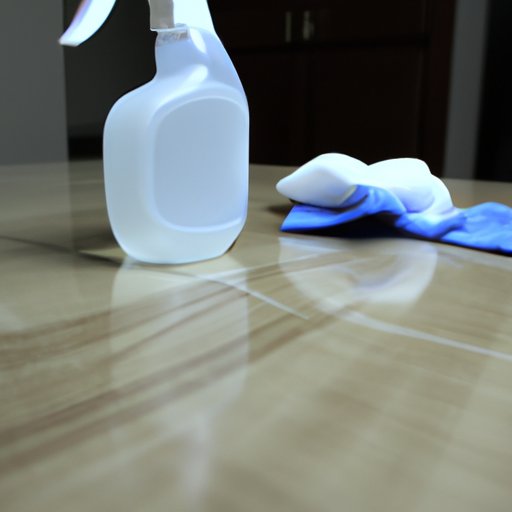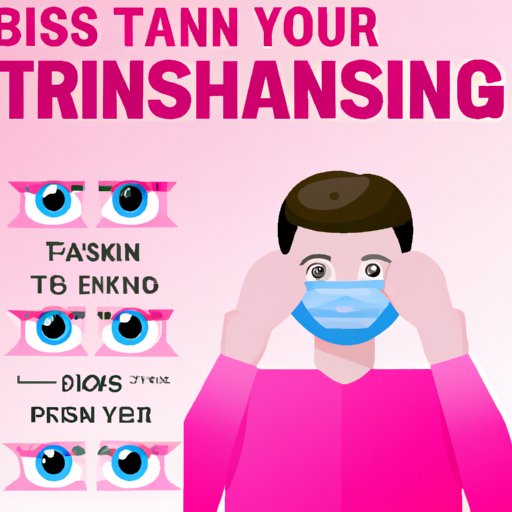Introduction
Pink eye, or conjunctivitis, is an inflammation of the thin membrane that lines the inside of your eyelids and covers the white part of your eye. It’s caused by a virus, bacteria, allergens, or irritants in the environment, and is highly contagious. Symptoms include redness, itching, burning, watery eyes, and discharge. While pink eye usually resolves on its own without treatment, it can be uncomfortable and inconvenient. Fortunately, there are steps you can take to reduce your risk of getting pink eye.
Avoiding Touching Your Eyes
One of the easiest ways to reduce your risk of getting pink eye is to avoid touching your eyes. This is because when you touch your eyes, you can transfer germs, bacteria, and viruses from your hands to your eyes, which can cause infection. Additionally, rubbing your eyes can cause irritation and inflammation, which can make you more vulnerable to infection.
Here are some tips for preventing unnecessary touching of your eyes:
- Keep your hands away from your face as much as possible.
- If you need to touch your face, use clean hands.
- Be mindful of your surroundings, especially if you’re in a public place.
- If you wear contact lenses, practice proper hygiene and follow the instructions provided by your doctor.
- If you wear glasses, make sure they fit properly and aren’t too tight.
Washing Your Hands Regularly
Washing your hands regularly is another important step in preventing pink eye. Proper handwashing helps remove germs, bacteria, and viruses from your hands before they can be transferred to your eyes. It’s especially important to wash your hands before touching your eyes, eating, or preparing food.
Here are some tips for washing your hands properly:
- Use warm water and soap.
- Rub your hands together for at least 20 seconds.
- Pay special attention to your fingernails, wrists, and palms.
- Rinse your hands thoroughly.
- Dry your hands with a clean towel or air dryer.
Avoiding Contact With Infected People
Another way to reduce your risk of getting pink eye is to avoid contact with people who are already infected. If you notice someone with signs of pink eye, such as redness, swelling, or discharge, it’s best to keep your distance. Additionally, it’s important to be aware of any changes in your own eyes and seek medical attention if necessary.
Here are some strategies for social distancing:
- Avoid close contact with people who have pink eye.
- Avoid shaking hands or hugging people who may be infected.
- Stay at least six feet away from people who have pink eye.
- If you are in close contact with someone who has pink eye, wear a face mask.
- Cover your mouth and nose with a tissue when coughing or sneezing.
Not Sharing Personal Items
Sharing personal items can increase your risk of getting pink eye, as the virus can be spread through contact with contaminated surfaces. To reduce your risk, avoid sharing items such as towels, washcloths, pillows, and makeup. If you do share items, make sure to disinfect them before and after use.
Here are some common personal items to avoid sharing:
- Towels
- Washcloths
- Pillows
- Makeup
- Eyeglasses or sunglasses
- Contact lenses or lens cases
- Kleenex or other tissues
- Hairbrushes or combs
Here are some steps for disinfecting shared items:
- Wash with hot, soapy water.
- Rinse with clean water.
- Disinfect with a solution of one part bleach to nine parts water.
- Allow the item to air-dry.

Keeping Your Home and Work Spaces Clean
Maintaining a clean home and work environment is also essential for preventing pink eye. Regularly cleaning and disinfecting surfaces can help reduce the spread of germs and bacteria. Additionally, using air filtration systems and keeping windows open can help reduce airborne particles that can cause irritation and infection.
Here are some tips for deep cleaning:
- Vacuum carpets and upholstered furniture regularly.
- Dust surfaces with a damp cloth.
- Wash bedding, curtains, and other fabric items frequently.
- Clean hard surfaces with an appropriate cleaner.
- Disinfect surfaces with a solution of one part bleach to nine parts water.
Here are some strategies for maintaining a clean environment:
- Open windows to allow fresh air to circulate.
- Use air filtration systems to reduce airborne particles.
- Regularly change air filters.
- Minimize clutter to reduce dust accumulation.
- Discard old books and magazines.
- Avoid smoking indoors.
Wearing Protective Eyewear
Finally, wearing protective eyewear can help protect your eyes from infection. Sunglasses, goggles, and safety glasses can all provide an extra layer of protection against germs and bacteria. Additionally, these types of eyewear can help reduce exposure to irritants such as dust and pollen, which can lead to eye irritation and infection.
Here are some types of protective eyewear:
- Sunglasses
- Goggles
- Safety glasses
- Swim goggles
Here are some benefits of wearing protective eyewear:
- Reduces exposure to germs, bacteria, and viruses.
- Helps protect against irritants such as dust and pollen.
- Reduces glare from sunlight.
- Protects eyes from flying debris and other hazards.
Conclusion
Pink eye is a common eye infection that can be uncomfortable and inconvenient. Fortunately, there are steps you can take to reduce your risk of getting pink eye, including avoiding touching your eyes, washing your hands regularly, avoiding contact with infected people, not sharing personal items, keeping your home and work spaces clean, and wearing protective eyewear. By following these steps, you can help protect your eyes from infection and irritation.
(Note: Is this article not meeting your expectations? Do you have knowledge or insights to share? Unlock new opportunities and expand your reach by joining our authors team. Click Registration to join us and share your expertise with our readers.)
